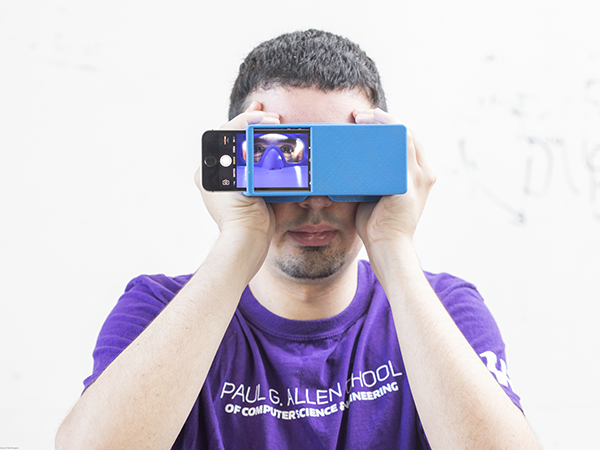 They say that the eyes are a window to the soul; with a new smartphone app developed by researchers at the University of Washington, they are now also a window to one’s health. Members of the Allen School’s UbiComp Lab, working with clinicians at UW Medicine, developed BiliScreen to enable anyone to snap a selfie and get screened for pancreatic cancer. The app detects adult jaundice — an early symptom of the disease — to enable more timely intervention and better outcomes for people at risk of developing one of the deadliest forms of cancer.
They say that the eyes are a window to the soul; with a new smartphone app developed by researchers at the University of Washington, they are now also a window to one’s health. Members of the Allen School’s UbiComp Lab, working with clinicians at UW Medicine, developed BiliScreen to enable anyone to snap a selfie and get screened for pancreatic cancer. The app detects adult jaundice — an early symptom of the disease — to enable more timely intervention and better outcomes for people at risk of developing one of the deadliest forms of cancer.
Jaundice is a yellowing of the skin and eyes produced when excess bilirubin is present in the bloodstream. The condition can be an indicator of a variety of diseases, including pancreatic cancer and hepatitis. In the case of the former, by the time a patient’s jaundice becomes visible, the condition often has advanced past the point of successful treatment.
“The eyes are an interesting gateway to the body,” said Shwetak Patel, director of the UbiComp Lab and a professor in the Allen School and UW Department of Electrical Engineering, in a UW News release. “Our question was: Could we capture some of these changes that might lead to earlier detection with a selfie?”
It turns out that they could by combining a smartphone’s camera, computer vision, and machine learning. Using a selfie of someone’s eyes, BiliScreen applies computer vision algorithms to the image to isolate the sclera, or white part of the eye, for analysis. It then calculates color information from the pixels of the sclera, discarding blood vessels and eyelashes in the process, and uses machine learning to correlate the color descriptor with bilirubin levels to determine whether that person has jaundice.
The research team measured BiliScreen’s effectiveness in a clinical study involving 70 people, with the help of a 3-D printed box — similar to a Google Cardboard headset — to control for variations in lighting conditions. BiliScreen correctly identified jaundice nearly 90 percent of the time compared to the standard, more invasive blood test. The app can also be used with a second accessory, paper glasses printed with colored squares to calibrate for differences in ambient lighting. The ultimate goal, however, is to remove the need for any accessories so that people can use the app anytime, anywhere, to instantly screen for a disease that has a five-year survival rate of just nine percent.
“By the time you’re symptomatic, it’s frequently too late,” noted Allen School Ph.D. student Alex Mariakakis, lead author of the research paper. “The hope is that if people can do this simple test once a month — in the privacy of their own homes — some might catch the disease early enough.”
Patel and Mariakakis developed BIliScreen working with UW Medicine professors James Taylor and Lei Yu, Allen School undergraduate Megan Banks, and research study coordinator Lauren Phillipi. The project builds on an earlier collaboration between the UbiComp Lab and UW Medicine that produced BiliCam, an app that is effective in screening for newborn jaundice that is the subject of a recent article published in the journal Pediatrics.
BiliScreen will be presented at the UbiComp 2017 conference next month in Maui, Hawaii.
Read the UW News release here, the research paper here, and visit the BiliScreen project page here. Check out coverage of BiliScreen by IEEE Spectrum, GeekWire, PBS News Hour, The Independent, and Vice News.
Photo credit: Dennis Wise/University of Washington

